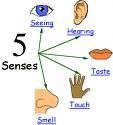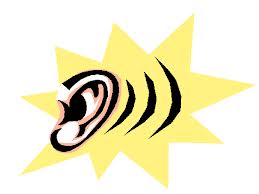The Five Senses

All About The Five Senses
Senses work by receiving stimuli at the sense organs - eyes, ears, skin, tongue, and nose. Each sense organ is sensitive to a particular kind of stimulus. The eyes are sensitive to light; the ears, to sound; the olfactory organs of the nose, to odor; and the taste buds of the tongue, to taste. Various sense organs of the skin and other tissues are sensitive to touch, pain, temperature and other sensations.
When stimuli is received, the sense organ translates them into nerve impulses that are transmitted along the sensory nerves to the brain. In the cerebral cortex, the impulses are interpreted, or perceived, as sensations. The brain associates them with other information, acts upon them, and stores them as memory.

Improving Eyesight Naturally with Vitamins & Herbs
As we age, our eyesight weakens due to a number of factors, including degeneration of nerve cells in the eyes. We gradually lose our ability to notice fine details and differentiate subtle shades of colors. Can these eyesight problems be reversed or improved? In many people, they can.
It is important for everyone to find out how to improve their eyesight naturally in order to avoid the many vision problems that could affect you during your lifetime.
Another very important step to improve vision is proper eye care. It's important not to sit very close to the television screen or stare at the computer for extended periods of time. Always take a break and rest your eyes to help prevent possible serious damage.
It is advised that everyone wear sunglasses during the summer and protective goggles when performing any task that might result in materials coming in contact with your eyes. Be sure to always wash your hands before touching or rubbing your eyes, and do your best to avoid excessive contact with your eyes.
It is possible to improve eyesight naturally by incorporating theraputic herbs, vitamins and minerals into your nutritional program. These natural nutrients can also help promote overall health, as they all contain many therapeutic compounds.
There are three theraputic herbs we will focus on in this article: Bilberry Extract, Aspalathus, and Mahonia Grape Extract. We will also discuss two vitamins important to eyesight: Vitamin C and Vitamin E. Finally, we'll take a look at two important minerals: Zinc and Fish Oil.
Bilberry is a theraputic herb that contains anthocyanosides that may decrease the rate of macular degeneration and prevent the occurrence of other retinal conditions. Bilberry protects veins and arteries in the eye, and helps with night vision.
Aspalathus is a powerful herb native to South Africa. this herb, also know as rooibos contains antioxidants similar to bilberry and can promote eye health as well as improve immune function.
Mahonia Grape Extract protects the eyes from UV rays and sun damage, while at the same time it strengthens the capillaries in the retina. Mahonia can help slow eye aging and helps maintain overall eye health.
Vitamin E is a powerful antioxidant that has been shown to slow the onset of macular degeneration - the most common cause of loss of eyesight, and protect the retina.
Vitamin C is also an antioxidant and it works alongside Vitamin E to protect tissues and improve eye health.
Zinc is an essential mineral required by all cells in the body. Zinc helps with the function of strengthening the cells of the eye.
Fish oil contains powerful compounds that can prevent macular degeneration and as well as other eye problems.
Please keep in mind that supplements are not likely to be helpful in serious and advanced eye disorders, but they can play an important role in mild to moderate cases of visual decline that occurs normally with the aging process.
As with all health supplements, results vary from person to person so be sure to consult your physician or qualified medical professional before taking any supplement to improve eyesight naturally.
Cool Sites About The Senses
- AGORA
This site offers information about past and current research on everything to do with aromatherapy along with in depth information on the various essential oils and applications of aromatherapy. - IncenseSite.info
A Site About Incense

Effectively Manage Tinnitus With These Simple Tips
The most common cause for tinnitus is exposure to loud noise. Short exposures to loud noise usually causes temporary tinnitus. Extended exposure, such as working in an industry with daily exposure to loud noises can cause long-term tinnitus. Protecting your hearing is always recommended. There are other causes of tinnitus, and if you are suffering with it, you should consult a doctor. These tips may also help you.
Learn to control your stress. You can use a variety of methods such as yoga, meditation, support groups, or making sure you get enough sleep. Anything that helps you decrease stress in your life is worth doing. The more stressed you are feeling, the more tinnitus flares up or bothers you.
Talk to your doctor about getting a blood test to check your zinc level. In people with low levels, zinc supplements have been shown to help many with their tinnitus. High levels of zinc supplements must be monitored by a doctor, so do not take or increase zinc supplements without the advice of a physician.
Research the various natural remedies for tinnitus. There are many means that people were able to successfully treat tinnitus for centuries without the use of medication. Be sure to talk with your physician before trying something, as some herbs can interact with medication, and some of the options available may not be healthy for you.
Making sure you're getting enough exercise can help reduce the symptoms of tinnitus. The better your overall health is, the lower your blood pressure and the quieter the rushing sounds in your ears will be. It can also help you rid your body of toxins, which can clog your ear canal even more.
While it is true that a common cause of tinnitus is exposure to loud noise levels, there are other causes as well. Other causes include ear infections and buildup of earwax, and many medicines list tinnitus as a side effect. The good news is that there are treatments and strategies, like those described above, which can help you.

Common Types of Smelling Disorders
Smelling disorder happens when the olfactory sense - the sense of smell is disturbed. This disturbance can lead to problems ranging from the total loss of smell - anosmia, to dysosmia, a distorted sense of smell.
A person with a normal sense of smell (normosmia) can distinguish between 10,000 smells. The sense of smell stimulates salivary glands, which is why the sense of taste is connected to the sense of smell. People with smelling disorders usually have some loss of taste also.
A dysfunctional sense of smell is generally not life-threatening, but it can be dangerous. Without a sense of smell, a person might eat spoiled food, might not be able to detect a gas leak or smell if something is burning. Loss of smell and the resulting loss of taste could also lead to depression.
Sometimes the loss of the sense of smell, anosmia, is temporary, like with a cold or flu. On the other hand, a head injury could cause permanent anosmia. A head injury could also produce dysosmia, the distorted sense of smell that causes a person to hallucinate a foul odor.
Smelling disorders can be defined as follows:
Anosmia - this the loss of the sense of smell. This is the most common smelling disorder and it can be temporary or permanent.
Dysosmia - this is a distorted sense of smell that causes a person to hallucinate unpleasant odors. It is usually caused by medical or mental conditions.
Hyperosmia - this is an increased sensitivity to smell.
Hyposmia - this is the diminished sense of smell. This is usually a temporary condition caused by the flu.
Presbyosmia - this is loss of smell that occurs when a person ages.
Smelling disorders can be caused by many things. Some of the most common causes are nasal polyps, viral upper respiratory infection, atrophic rhinitis (wasting away of the mucus membrane), hypertrophic rhinitis (thickening of the mucous membrane), smoking cigarettes, a crooked nose or a deviated septum, destruction of the olfactory bulbs, tracts, or central connections (caused by head trauma, infections or sinus surgery), head injury, prolonged use of medications such as antihistamines and decongestants, drugs like amphetamines, estrogen, naphazoline, phenothiazines, and resperine, the aging process, a tumor behind the nose or in the membranes surrounding the brain, lead poisoning, exposure to insecticides or other chemicals, radiation therapy, and nervous disorders.
There are many different treatments for smelling disorders. These treatments range from lifestyle changes to surgery. Treating mental disorders can sometimes affect the sense of smell, but in some cases the sense of smell can't bereinstated. Anosmia associated with aging is not treatable.
Some common treatments for smelling disorders are saline sprays, quitting smoking, over-the-counter antihistamine such as Actifed, avoiding allergens, antibiotics for infections, prescribed steroids such as Prednisone, surgical treatment, removal of nasal polyps and benign tumors, septoplasty to straighten the nasal passage, rhinoplasty to straighten the structure of the nose, and sinus surgery to open sinus drainage channels.
Not all causes of smelling disorders are preventable. People with a smelling disorder obviously should not smoke and should ask those around them not to smoke. People who have smelling disorders related to allergies should try to to avoid what they're allergic to. Since head trauma injuries can lead to smelling disorders, people should wear protective helmets when bicycling or participating in sports like football or hockey.









